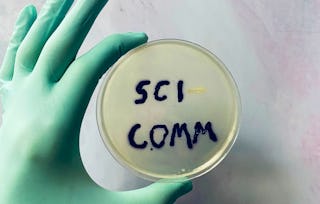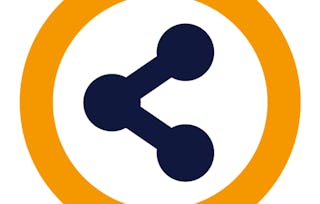Fake News oder gute Wissenschaft? In einer Welt, in der wir Zugang zu unbegrenzten Informationen haben, ist es schwer, die Echokammer der Meinungen zu durchschauen, die von Emotionen und persönlichen Vorurteilen angeheizt werden und nicht von wissenschaftlichen Beweisen. In Science Literacy lernen Sie, wie Wissenschaft funktioniert, wie Sie kritisch denken können, wie Sie Wissenschaft von Pseudowissenschaft unterscheiden können, wie indigene Weisheiten in die Wissenschaft einfließen können, wie Sie eine wissenschaftliche Studie verstehen und konzipieren können und wie Sie die wissenschaftliche Kommunikation in den Medien kritisch bewerten können. In jedem Modul werden Ihre neuen Fähigkeiten anhand von Beispielen aus dem wirklichen Leben vertieft, und am Ende jedes Moduls müssen Sie diese Fähigkeiten auf wissenschaftliche Fragen, Gesprächsthemen und Kontroversen in der Welt anwenden. Warnung: Dieser Kurs erfordert Aufgeschlossenheit und die Fähigkeit zur Selbstreflexion. In Science Literacy hören Sie von besonderen Gästen: Timothy Caulfield, Canada Research Chair in Health Law and Policy und Star des Netflix-Films "A User's Guide to Cheating Death" über Pseudowissenschaft Dr. Torah Kachur, Wissenschaftlerin und CBC-Journalistin über Wissenschaftskommunikation (und Fehlkommunikation!) Christian Nelson, Citizen Scientist und Gründer von Edmonton Weather Nerdery, über Versuchsplanung Metis Elder Ghostkeeper und Cree Elder Kokum Rose Wabasca, über die ganzheitliche Natur der indigenen Weisheit und wie sie mit dem wissenschaftlichen Prozess zusammenarbeiten kann Associate Professor in Psychologie, Dr. David Rast über Unsicherheit und Entscheidungsfindung

Wissenschaftliche Alphabetisierung

281 Bewertungen
Empfohlene Erfahrung
Was Sie lernen werden
Lernen Sie, kritisch zu denken und die wissenschaftliche Methode zu verstehen
Lernen Sie, ausgewogene und logische wissenschaftliche Argumente zu formulieren, wissenschaftliche Forschungsarbeiten zu lesen und zu gestalten
Lernen Sie, wie Sie Wissenschaft von Pseudowissenschaft, gefälschter Wissenschaft und schlechter Wissenschaft unterscheiden und abgrenzen können
Werden Sie wissenschaftlich gebildet und können Sie Informationen in den Mainstream-Medien und in den sozialen Medien sowie im täglichen Leben kritisch bewerten
Kompetenzen, die Sie erwerben
- Kategorie: Forschung
- Kategorie: Forschungsdesign
- Kategorie: Wissenschaftliche Methoden
- Kategorie: Statistische Analyse
- Kategorie: Kulturelle Vielfalt
- Kategorie: Deskriptive Statistik
- Kategorie: Methoden der Forschung
- Kategorie: Korrelationsanalyse
- Kategorie: Deduktive Argumentation
- Kategorie: Peer Review
- Kategorie: Medien und Kommunikation
- Kategorie: Wahrscheinlichkeit & Statistik
- Kategorie: Kommunikation
- Der Fähigkeiten-Abschnitt ist eingeklappt. 9 von 13 Fähigkeiten werden angezeigt.
Wichtige Details
33 Aufgaben
Erfahren Sie, wie Mitarbeiter führender Unternehmen gefragte Kompetenzen erwerben.

In diesem Kurs gibt es 5 Module
Willkommen bei Science Literacy! In einer Welt, in der wir Zugang zu unbegrenzten Informationen haben, ist es schwer, die Echokammer der Meinungen zu durchschauen, die von Emotionen und persönlichen Vorurteilen angeheizt werden und nicht von wissenschaftlichen Beweisen. In Science Literacy lernen Sie, wie Wissenschaft funktioniert, wie Sie kritisch denken können, wie Sie Wissenschaft von Pseudowissenschaft unterscheiden können und wie Sie die wissenschaftliche Kommunikation in den Medien kritisch bewerten können. In diesem ersten Modul hören wir von den Ältesten der Eingeborenen etwas über den traditionellen Prozess des Sammelns von Wissen und wie dieser genutzt werden kann, um wissenschaftliche Hypothesen zu inspirieren, zu festigen und zu validieren. Wir stellen Ihnen den Prozess und den Zweck wissenschaftlichen Denkens vor und geben Ihnen einige Tipps und Tricks, wie Sie Voreingenommenheit in Argumenten erkennen können und wie Sie gesunden Menschenverstand und Intuition von echten wissenschaftlichen Theorien unterscheiden können. Im ersten Video lernen Sie auch Ihre Moderatoren Claire und Rachel kennen. Also, fangen wir an und machen Sie sich wissenschaftlich schlau!
Das ist alles enthalten
7 Videos10 Lektüren4 Aufgaben
In diesem Modul lernen Sie, wie Sie Wissenschaft von Pseudowissenschaft unterscheiden und abgrenzen können. Wir werden uns einige gängige Beispiele für Pseudowissenschaft im Alltag ansehen und üben, sie von Wissenschaft, schlechter Wissenschaft und schlichtweg betrügerischer Wissenschaft zu unterscheiden. Schließlich werden wir herausfinden, was die pseudowissenschaftliche Sprache so anziehend macht, wie man sie bekämpfen kann, indem man skeptisch bleibt, und den Schaden untersuchen, den Pseudowissenschaft anrichten kann, wenn sie nicht bekämpft wird.
Das ist alles enthalten
3 Videos7 Lektüren10 Aufgaben1 Diskussionsthema
In diesem Modul lernen Sie eine grundlegende Fähigkeit der wissenschaftlichen Bildung - kritisches Denken! Wir führen Sie in die Grundlagen des kritischen Denkens ein, bevor wir Ihnen die Werkzeuge an die Hand geben, mit denen Sie versuchen können, das kritische Denken auf konkrete Fallstudien anzuwenden. Wir werden auch das Konzept der Korrelation einführen und den Unterschied zwischen Korrelation und Kausalität aufzeigen. Wir werden auch die Bedeutung der Replizierbarkeit und den Wert (und die Last) von außergewöhnlichen Beweisen untersuchen. Schließlich werden wir uns mit der Arbeit von Karl Popper befassen und entdecken, warum Falsifizierbarkeit das Herzstück wissenschaftlicher Bildung ist. Und während komplexe Verschwörungstheorien die X-Akten-Fans in uns ansprechen mögen, ist in der Wissenschaft die einfachste Erklärung oft die wahrscheinlichste, die richtig ist. Also kommen Sie, es ist Zeit, kritisch zu werden!
Das ist alles enthalten
6 Videos19 Lektüren10 Aufgaben
In diesem Modul tauchen wir tief in die besonderen Methoden ein, die Wissenschaftler anwenden, um Wissen und Verständnis für die Welt um uns herum zu schaffen. Wir werden die verschiedenen Teile einer wissenschaftlichen Abhandlung analysieren, lernen, dass es einen Weg gibt, selbst die dichtesten wissenschaftlichen Abhandlungen zu lesen und geben Ihnen die Möglichkeit, diese neuen Fähigkeiten auszuprobieren. Sie werden auch lernen, wie man ein wissenschaftliches Experiment aufbaut, von der Formulierung Ihrer Hypothese über die Auswahl Ihrer Variablen bis hin zur Wahl der am besten geeigneten Forschungsmethode, von der Naturstudie bis zur Umfrage. Nach diesem Modul werden Sie nicht nur in der Lage sein, wissenschaftliche Berichte zu lesen und zu verstehen, sondern auch, Ihre eigenen zu entwerfen und durchzuführen!
Das ist alles enthalten
4 Videos13 Lektüren1 Aufgabe
Wer kennt Sie besser als Ihre Kollegen? Nun, wenn Sie Wissenschaftler sind... niemand! In diesem Modul befassen wir uns mit allen Aspekten des Peer-Review-Systems, durch das wissenschaftliche Erkenntnisse veröffentlicht werden - mit seinen Vorzügen und seinen Unzulänglichkeiten. Wir werden uns ansehen, wie Statistiken verwendet werden können, um wissenschaftliche Theorien zu untermauern, aber auch, wie sie verwendet werden können, um falsche Korrelationen und fragwürdige Daten zu untermauern! Wir werden uns auch ansehen, wie die Medien Wissenschaft kommunizieren und falsch kommunizieren und wie sogar Wissenschaftler selbst in die Fallen der Schärfung, Nivellierung und Pseudosymmetrie tappen können. Schließlich werden wir uns mit offenen Daten und offenem Zugang als Option zur Verbesserung der Wissenschaftskommunikation und zur Verbesserung des Zugangs der breiten Öffentlichkeit zu wissenschaftlicher Forschung befassen, so dass diese nicht auf die sozialen Medien angewiesen ist!
Das ist alles enthalten
7 Videos25 Lektüren8 Aufgaben
Dozent

Mehr von Grundlagen der Wissenschaft entdecken
 Status: Vorschau
Status: VorschauUniversity of Colorado Boulder
 Status: Vorschau
Status: VorschauErasmus University Rotterdam
 Status: Kostenloser Testzeitraum
Status: Kostenloser TestzeitraumUniversity of Colorado Boulder
 Status: Kostenloser Testzeitraum
Status: Kostenloser TestzeitraumUniversity of Colorado Boulder
Warum entscheiden sich Menschen für Coursera für ihre Karriere?

Felipe M.

Jennifer J.

Larry W.

Chaitanya A.
Bewertungen von Lernenden
- 5 stars
63,47 %
- 4 stars
21,63 %
- 3 stars
6,73 %
- 2 stars
2,83 %
- 1 star
5,31 %
Zeigt 3 von 281 an
Geprüft am 21. Jan. 2021
Thank you very much. This course is so timely. I highly recommend this.
Geprüft am 26. Apr. 2022
Good course and very informative. Looking back on some of my beliefs and what I have digested as information, I now can critically evaluate thier weight.
Geprüft am 29. Nov. 2020
Excellent course for the science-minded and those who aren't. The course study is definitely needed to help navigate the tsunami of info that can so easily drown us all.

Neue Karrieremöglichkeiten mit Coursera Plus
Unbegrenzter Zugang zu 10,000+ Weltklasse-Kursen, praktischen Projekten und berufsqualifizierenden Zertifikatsprogrammen - alles in Ihrem Abonnement enthalten
Bringen Sie Ihre Karriere mit einem Online-Abschluss voran.
Erwerben Sie einen Abschluss von erstklassigen Universitäten – 100 % online
Schließen Sie sich mehr als 3.400 Unternehmen in aller Welt an, die sich für Coursera for Business entschieden haben.
Schulen Sie Ihre Mitarbeiter*innen, um sich in der digitalen Wirtschaft zu behaupten.
Häufig gestellte Fragen
Um Zugang zu den Kursmaterialien und Aufgaben zu erhalten und um ein Zertifikat zu erwerben, müssen Sie die Zertifikatserfahrung erwerben, wenn Sie sich für einen Kurs anmelden. Sie können stattdessen eine kostenlose Testversion ausprobieren oder finanzielle Unterstützung beantragen. Der Kurs kann stattdessen die Option "Vollständiger Kurs, kein Zertifikat" anbieten. Mit dieser Option können Sie alle Kursmaterialien einsehen, die erforderlichen Bewertungen abgeben und eine Abschlussnote erhalten. Dies bedeutet auch, dass Sie kein Zertifikat erwerben können.
Weitere Fragen
Finanzielle Unterstützung verfügbar,

